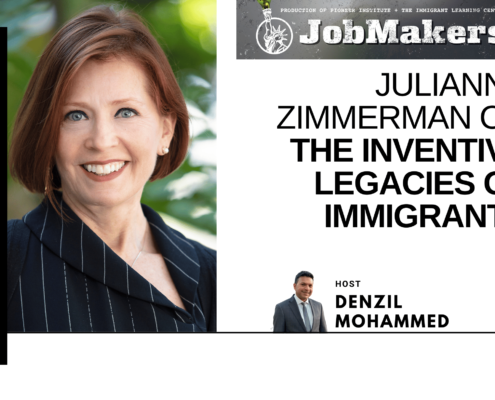Saboor Sakhizada: Afghan Translator, Child of War
/in Featured, JobMakers /by Editorial Staff
This week on JobMakers, Host Denzil Mohammed talks with Abdul Saboor Sakhizada, who worked as an instructor, manager and translator for the U.S. Army (and received a Department of the Army Superior Civilian Service Award) in Kabul, Afghanistan. In the first of a two-part special, we get to know Afghanistan and its people, examine the fallout of the government collapse and learn how Saboor is actively working in the most difficult and chaotic of circumstances to get as many people evacuated from Afghanistan as possible. This week, we hear about the fascinating but tragic life in Afghanistan from Saboor, a self-described child of war, and we discover what those 50,000 interpreters had to endure every day, fueled by patriotism and targeted as traitors, in this special episode of JobMakers.
Guest:
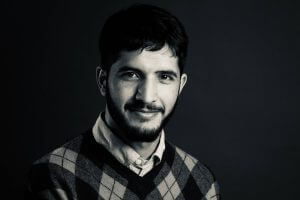 Abdul Saboor Sakhizada grew up in Afghanistan, and studied world affairs and other subjects at Syracuse University. He has taught in multiple settings, from military missions to refugee resettlement, and managed diverse teams that developed programs and advocated for the most vulnerable. He has communicated across different cultures, through professional experiences with NGOs, IGOs, and in military and civil society. Outside of work, he has facilitated and created opportunities for cultural interaction, coached soccer, and volunteered to mentor and interpret for newly arrived refugees in upstate New York.
Abdul Saboor Sakhizada grew up in Afghanistan, and studied world affairs and other subjects at Syracuse University. He has taught in multiple settings, from military missions to refugee resettlement, and managed diverse teams that developed programs and advocated for the most vulnerable. He has communicated across different cultures, through professional experiences with NGOs, IGOs, and in military and civil society. Outside of work, he has facilitated and created opportunities for cultural interaction, coached soccer, and volunteered to mentor and interpret for newly arrived refugees in upstate New York.
Get new episodes of JobMakers in your inbox!
Read a Transcript of This Episode:
Please excuse typos.
Denzil Mohammed:
I’m Denzil Mohammed. And this is a special episode of job makers.
Denzil Mohammed:
Afghan refugees. Who’ve helped us and coalition forces have begun their resettlement here. The U S has long given refuge to those forced to flee. That’s how the United States of America began and in, so doing it has enriched itself through the fighting spirit of those determined to survive, but for how long will America’s embrace last public support for resettling Africans here, hold. And furthermore, what does the American public really know about these refugees from Afghanistan? For Abdul Saboor Sakhizada, who worked as an instructor manager and translator for the U S army in Kabul, it is not just crucial but necessary that the U S taken those who have helped all brave soldiers in this two-part special of job makers. We get to know Afghanistan and its people examined. The fallout of the government, collapsed a little ambulance, actively working in the most difficult and chaotic of circumstances to get as many evacuated as possible. This week, we heard about the fascinating but tragic life in Afghanistan from Abdul, a self-described child of war. And we discover what those 50,000 interpreters had to endure every day, fueled by patriotism and targeted as traitors in this special episode of Jobmakers, Abdul Abdul Saboor Sakhizada. Thank you for joining us on Jobmakers. It’s such an honor to have you on how are you,
Abdul Saboor Sakhizada:
I’m doing okay. Thanks for having me on.
Denzil Mohammed:
So obviously we’re going to talk about Afghanistan, but first of all, paint us a picture. What was life like in Afghanistan growing up?
Abdul Saboor Sakhizada:
So, you know, oftentimes I refer to myself as the child of war. I was born in the 1990s and Afghanistan, and for anyone who knows that history of that part of the world, you know, it’s, it’s nothing but destruction, violence and justice taking place. And obviously right around 1990s, you had the civil war and you had them, you had the dictatorship of Taliban. So I grew up right around that time. I was born around that time. I went to school right around that time and then up until 2001. So yes I could, I could, I guess I could officially say that I was, I was a child who didn’t get to play with toys. I, we, we got to play with you know, setting at home and counting the bullets though, was crossing over, over our heads and rockets and the airplanes that fly around. So it, it was you know, looking back, you know, I guess we’re blessed in a way, or I am blessed in a way though to survive that that sort of destruction that took place in that part of the region, but consider myself from that regards to having survived it lucky, but it was, you know, it was, I wished that I wished that life for no one because it’s it’s a state of hopelessness and, you know, it’s, it’s quite quite challenging.
Denzil Mohammed:
You reflect on your childhood and you’re amazed that you survived. Wow. That’s, that’s absolutely fascinating and, and really tragic. You know, what was you talk about counting bullets and jets? What exactly was happening around you?
Abdul Saboor Sakhizada:
I mean, so it was, it was th th the country, you know the country was divided or the city, and at least the Capitol where I lived or where my parents lived, the surgery was, was divided into different sections and, you know, the civil war and these different groups mostly divided by their own ethnic, ethnic ethnicity of different ethics, fighting for power you know, created a whole chaos of, you know, you know they, the search for power, they struggle to see who was going to be the most dominant force in the society. And then what you had in the middle of all these fighters or these groups, you had people like us who were living in and you know, getting hit from every corner. Sometimes you had to make this risky journey from one side of the city to another side, by going through one group of people, pretending to be someone else while transitioning to another group of people then to pretending to be someone else.
Abdul Saboor Sakhizada:
So it was, it was quite challenging. Obviously a feminine, the economic instability, the, the, the, the the difficulties of not making you, making sure that you have enough food on the table or at home for the families was, was very, very difficult. Like every morning we would go buy a pound of sugar or something, because that’s all we could afford. We didn’t have a savings stock of food that we could rely on at home. And so it, it was, it was crazy. There are countless numbers of days that we slept without food because we didn’t have it. We had to be strategic about how we want to eat in different times of the day, because we know we couldn’t make it. We didn’t have a three-time meal. It was like I said, I started by saying, I wished out for nobody quite challenging. And as a child being very active, you always want food, you always want bread. And then you go to your parents for giving me bread. And there isn’t any, so it’s hard, it’s a hard, it’s a hard life to live under. And, and but that’s beyond that’s past now. Again, quite lucky to have survived that, and I know millions of people did not make it.
Denzil Mohammed:
You talk about such insecurity and instability. What was education for you? Was that of a heat that, you know, traditionally we think of education as the way out of poverty, the way out of difficult circumstances, where did education lead you?
Abdul Saboor Sakhizada:
Yeah. I mean, it’s an interesting question because I’m reflecting back, you know, because you could not forecast what the future would look like. You know, a lot of folks would go, you know, nowadays we talk about, oh, I want to go to school because I want to be doctor. I want to be an engineer. I want to be this particular astronauts or whatever. But when I went to school, those ideas of what do I want to become, or what path do I want to take from early on in my education, it was not even a question mark in our heads. Honestly a lot of days we went to school.
Abdul Saboor Sakhizada:
It was just to get away from home and have something to do other than just sitting at home and not being able to do anything. And the schools we went into. I mean, I, I remember our classrooms didn’t have windows, our classroom didn’t have roof. And, and sometimes the school was so boring because we didn’t have enough teachers and tough. And because we had, you know, there was no roof, there was no windows. We were praying, there were days we would Cray for the rain to come, because when it rained, the school was dismissed, everyone would go home. And so it was so funny. We didn’t have no chairs, no tables. And we would all sit on a floor. I remember, I remember to this days when I was in, like, I can’t, it was fifth or sixth grade during the Taliban regime we used to wear turbines.
Abdul Saboor Sakhizada:
They were, we were forced to wear turbans and it was very difficult for me and my peers in my classroom. My classmates to manage the turban, because if it fell off, you had to organize it back in your head and you have to, you have to learn the basics of how to put a turban back together. But, you know, there were other subjects like we never, you know, all of the, all of the subjects that we studied were all different fields of an intrafaith an intrafaith, not interfaith, but intra faith of, you know, diving deep into different books and different avenues of understanding religious it’s almost, it was almost like a religious school, except that it was considered to be a public school. It was almost, you know, everything, you know, everything we were getting with, you had the teachers, the teachers were all sort of mullahs, those religious scholars of religious teachers who would come in and teach subjects. Our math teacher was a Mullah.
Denzil Mohammed:
Some point you started fighting in that country. Didn’t you, you joined, did you join the military?
Abdul Saboor Sakhizada:
So, you know, fast forward, you know, when when the us invaded Afghanistan in 2001 I was still in school. I was still you know, studying my, my oldest brother was old enough to you know, support us, serve us U S operation or us mission in Afghanistan. And so he joined with the special forces and he became an interpreter. And he, he offered support in, you know, for, in, in, from an economic standpoint, we needed that extra help at home. My parents needed it. And so he was another you know another person to bring bread on the table. And so it made sense. And and, and there was not much else to do. So my brother initially started this, this path of us joining and fighting the resistance or the insurgencies, and the better hope, you know, because early on the U S mission was, you know, after, after the government was taking the interim government was formed, you know, the ideas of constitutional democracy, you know, girls going back into school and all of it.
Abdul Saboor Sakhizada:
So it, this, this, this hope, this level, th this new new idea just emerged into our heads. And that was hope you could be anything, you could do anything. And, and you could become an engineer, or these new concepts began emerging that we, we had no ideas, TVs began coming back to life. And we, I did not know what TVs were like at that time or before, during the Taliban and music and all of these things. So you know, kind of, fast-forward when I graduated high school you know following my two oldest brothers, I kind of I followed the same path and, and my own capacity. I began serving and, and helping us soldiers and coalition soldiers coalition international community to, to kind of fight back and establish just new you know, a new shining city that’s about to rise.
Abdul Saboor Sakhizada:
You can see it above the horizon and all these ideas that are coming up into, to existence. So you could kind of imagine what that feeling would be like, that you’re not like a soldier grabbing weapon to fight because, you know, the last thing you want as a child, as a young teenager, the last thing you want to be is that you want to be close to guns and weapons because you grew up right around it. So that’s the that’s you had, you had enough of that. And so my, my goal was to to support the U S mission and, you know, and yeah, simultaneously helping my own communities thrive establish a government build a system where everyone was my own sisters and I’m the one could go to school. And so that, that kind of opened up the path for my sense of patriotism of, of helping, helping build that nation. So that’s where, kind of where I not, not necessarily putting a soldier, quote, unquote soldier uniform on, but perhaps in my own capacity, in my own,uway serving that,ubill, the communities, all communities,
Denzil Mohammed:
That’s absolutely stunning that, that suddenly you had hope and all these things that we take for granted music televisions, just cultures, knowing about all these different things that you live in such an integral world for your whole childhood.
Abdul Saboor Sakhizada:
It’s crazy. Cause I, sometimes I go to high schools and I present and I talk to high school, senior high school students that are about to go to college. And I, and I talk about sort of these ideas that don’t think these things for granted you know, you got windows, you’ve got eight or condition and your school, oh my God. These are unfamiliar concepts to a lot of people in different parts of the region. And I’m not saying that, you know, I think that societies like United States right now have to have to do what it had to do to get to where they are now. But, but the fact that you could appreciate what you have is a whole different dimension of, of, of realities that you have to deal with as you’re growing up. Because you know that, you know, you could, you could be in a different part of the world at a struggle in life, without all these things that you don’t have electricity. For example, computers, imagine writing hundreds and hundreds of pages of notes without having a computer or the cell phone.
Denzil Mohammed:
I saw an interview with you on Fox news. And you spoke about your time in Afghanistan, helping the forces including with Pete Hegseth. Is it tell us what it was like working as an interpreter?
Abdul Saboor Sakhizada:
Yeah. So with Pete exit and everyone, so we ran what’s what’s referred to as the, as the countership training center Afghanistan, and that was right around in 2007, 2008. Us mission began changing from hunting the surgency to winning or nation building to counterinsurgency this ideas of, of coins winning the hearts and minds of the people. And so we, we I was one of the first, I mean, Pete hikes that came later on, but when the inception of that academy took place, I was almost pretty much the only guy from the the beginning of this program. And excuse me, and soldiers would always go back and forth and deploy and they would complete their tours or complete their deployment. We turn back to their homes, homes, and PDX came in and that was right around time when I, I began slowly changing my role from doing interpretation to an administrative role, to more of a teaching becoming a visor teaching soldiers on culture, on language, on history, on politics.
Abdul Saboor Sakhizada:
Then, you know, helping folks like, like like Pete exit, understand what is it like to work with Afghans? And a lot of other soldiers who were getting deployed in Afghanistan. And so every soldier up until 2013, when the transition period began for that center that we were working on, because Africans started beginning Afghan security forces began taking that sorta a doctrine of counterinsurgency doctrine and embedded into their system. We you know we were teaching them and every soldier that entered Afghanistan, they would have to go through our training center for five days before would get deployed to their actual work zone or work area. And so that’s where Peter and I were pretty much instructors or, you know, advisors teaching them how to do this both in the capital, but also traveling outside capital, making, making trips to do it in the region.
Denzil Mohammed:
Pete mentioned, you know, once this was not your job, but you were with him and other officers and you’re pulling bodies out of vehicles, right?
Abdul Saboor Sakhizada:
Yeah. I mean, we, we had to, you know, as a young man, I had to experience some, some terrible, terrible sceneries that, you know, there was one thing of, of, of being in your home and seeing the bullets and rockets go above your head and you’re counting them. And then there’s another feeling of you’re actually in the mix of the war zone. You’re actually seeing bullets being shot at you. So it’s a different feeling early on in Afghanistan, when I, when I, when I started joining the military, because I was, I was right there with the soldiers. So there were a couple of instances where the service members of the United States are service members, but also coalition were were attacked. And and the second one that I was part of the first one, Pete, wasn’t even an Afghanistan back then, but the first one, the second one Pete Hegseth, and myself, we we jumped in on the becoming the QRF team, the quick reaction team that responded to that responded to that VB ID that took place that took bunch of our student.
Abdul Saboor Sakhizada:
Basically they forget a bunch of old students who were supposed to come and start a class. And so we, we responded to that. And then that was when Pete was talking about how we were pulling bodies of soldiers and civilians from vehicles that were destroyed or basically were burning so quite a horrible moment to, to live through. But that was something we had to do, what we had to do, because that was the, that was what we had to sign, what we signed up for not necessarily to pull dead bodies every single day, but that was part of the struggle. That was part of the battle. That was part of the mission is that you’re going to end up finding yourself in those moments and you have to be prepared to respond. And so that was what Pete was referring to in my interview. And he was exactly right,
Denzil Mohammed:
This, this was your environment, right? I mean, this is, this is where you live. This is what was happening. That’s really, really fascinating. What was, so part of what I’m doing here with you right now, at least in this portion of the podcast is painting that picture and having the American public understand what this place was like, what you all were going through, what your childhood was like to really understand the very, very stark differences. I mean, it’s a world away. What, a lot of what you’re describing to me what was the experience like for you personally working with the us? What did that feel like? And what was the public reaction to your working with the military?
Abdul Saboor Sakhizada:
I mean, traditionally from a family standpoint, right? So my brother had my, my oldest brother began working and then my second oldest, and then followed up to me. It was all the sense of patriotism. You’re, you’re doing something for your country. You’re helping build the nation. You’re, you’re doing all of this work. And even, you know, even, you know, reflecting on what we did in Afghanistan, and here we are in a state sign and, you know, knowing where the mission of United States is right now, it will basically ended in the way they would weld from Afghanistan. For, for me, or for us as a family it always was a reflection of, you know, we had seen enough destruction. We had seen enough violence. We had seen enough horrific scenery of people getting killed. Millions of people fleeing the country, taking refuge to the neighboring neighboring countries.
Abdul Saboor Sakhizada:
You know, I, I, we didn’t have financially, it was not financially. It was not feasible for my family to do. I always stumped. I always think about this because had I had my father had the financial means to emigrate or take refuge to other country, we would have been probably somewhere else in the 1990s. But because we didn’t do it, we couldn’t, we didn’t have the financial means to, to out migrate or to live, leave the country. You know, we had to basically live and, and accept the realities that we lived. And so it’s, you know, I have to say that, you know, even when I, when I started working with the army from this idea of patriotism, that sense of patriotism later on the, the conflict or this battle, this, this irregular war became so complicated that, you know th the insurgents were very smart.
Abdul Saboor Sakhizada:
They knew, you know, that a lot of these soldiers like Pete Hegseth that would rely on their interpreters and their cultural advisers to help them understand the ins and outs of the community. So they could better serve those communities. So they could better develop systems and policies that could help benefit the people. And so, what they had to do as they started, they started hunting folks like me and folks like my brother and, and others of our peers. And, and because they knew what a critical role we played, because essentially we were the eyes and ears of the U S military of Afghanistan. We knew the language, we knew the body language. We knew the culture, we knew the dynamics that played into they you know the different ethnicities and, you know, you know, all of that.
Abdul Saboor Sakhizada:
So and they began haunting us. And a lot of thousands of interpreters have lost their lives and advisors have lost their lives because they were they were isolated and they, they were targeted. And, and so that’s, it’s essentially that whole sense of patriotism of you being so proud of serving, building your nation, essentially flipped on its head. And the other side of the coin was quite evil, quite dark. And, and you have to go and hiding your identity. You have to disappear from society. You have to hide from your peers, from your friends. And so it, it is, it is it is an overnight shift that sometimes psychologically very hard for you to process, because here you are, you can’t go to soccer games anymore. Here you are. You can participate in, in, in wedding ceremonies, you can be away from home when, when the sun sets and you, you, you know, you know, all of those things, you can tell people what you’re doing.
Abdul Saboor Sakhizada:
So essentially paints us very negative, dark picture in your mind. And you began questioning every single thing you do from that point on not only for yourself, but also for your family, for your loved ones, because no one wants to identify my parents, that his son is working because they could easily target him. I lost my uncle, my uncle and, and and host province. He took the, he initiated bringing a chapter of a TV station that was aired in Kabul at the Capitol. He helped install their antennas into host, and one of the provinces and their districts that where he lived, and literally within three months, he was dead. They, they, they dropped his body in a bag in front of their house. And so that was a lesson for hundreds of other villagers in that area, or people off that family that this is what you get for doing this. If you go against us is what you get,
Denzil Mohammed:
You’re doing this work, and you’re talking about it within this frame of patriotism of doing things for your country. And at the same time, you’re seen as a traitor, someone betraying your country, and I guess your values and your history. And that’s absolutely fascinating. And how old were you when this is happening?
Abdul Saboor Sakhizada:
So I started working with the us armed forces when I was 17 years old, right after high school. You know, it’s funny. Sometimes I talk about it and it hurts me because I played I played for the nationals of my country. I played soccer for the nationals of my country and I, there was at one point when I started working that I had to bring money to the family, that I had to decide between my soccer career versus working for the military. And I chose the latter as you, as you could imagine. And I still think what we did was great, and I’m not trying to paint this negative picture, but you know, seeing what my other brothers did and follow that path,
Denzil Mohammed:
You mentioned, you know, being seen as a traitor, betraying your country and come to the present day. You also feel a sense of betrayal, but not from those people in Afghanistan, but from America and coalition forces. Thank you for joining us for the first of this two-part special of job makers. Next week, we come to terms with the pullout of security forces and the chaos and dread that’s resulted Lynn about the ad hoc and creative ways. Abdul is getting family and friends out and find out how we can all be welcomers to those who helped us. Those in need. We return to regular episodes of Jobmakers on October 14th, I’m Denzil Mohammed. Join us next Thursday at noon for the last of this two-part special of Jobmakers.
Browse recent episodes:
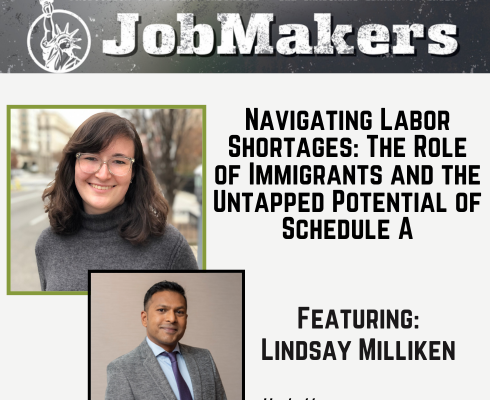
Navigating Labor Shortages: The Role of Immigrants and the Potential of Schedule A
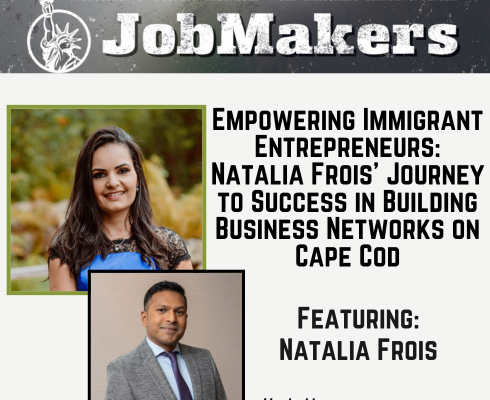
Empowering Immigrant Entrepreneurs: Natalia Frois’ Journey to Success in Building Business Networks on Cape Cod
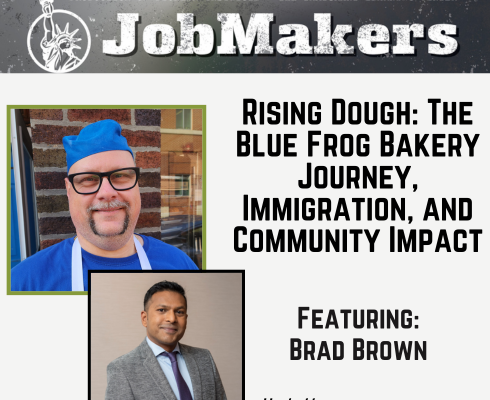
Rising Dough: The Blue Frog Bakery Journey, Immigration, and Community Impact
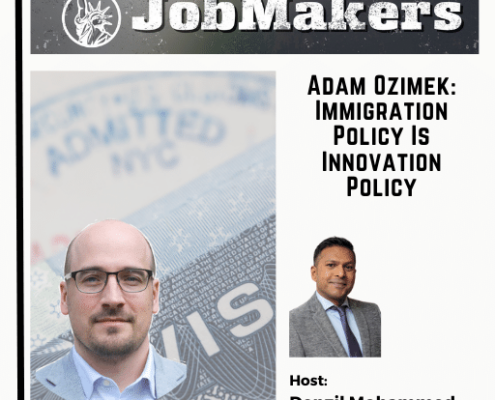
Adam Ozimek: Immigration Policy Is Innovation Policy

Sebastian Corbat Brings Us Healthy Foods ‘From the South’

Benjamin F. Jones Shows How Immigrants Are a Boon for the U.S.
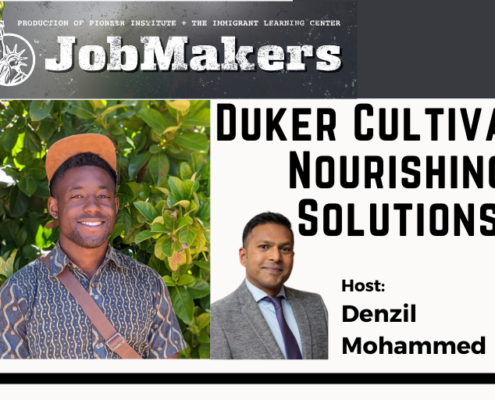
Duker Cultivates Nourishing Solutions
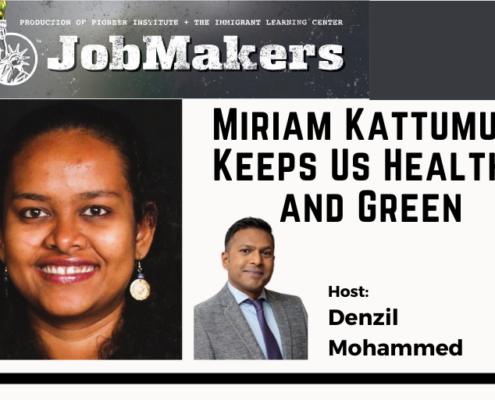
Miriam Kattumuri Keeps Us Healthy and Green

Erick Widman, Esq.: Immigrants Can Ease Worker Shortage
